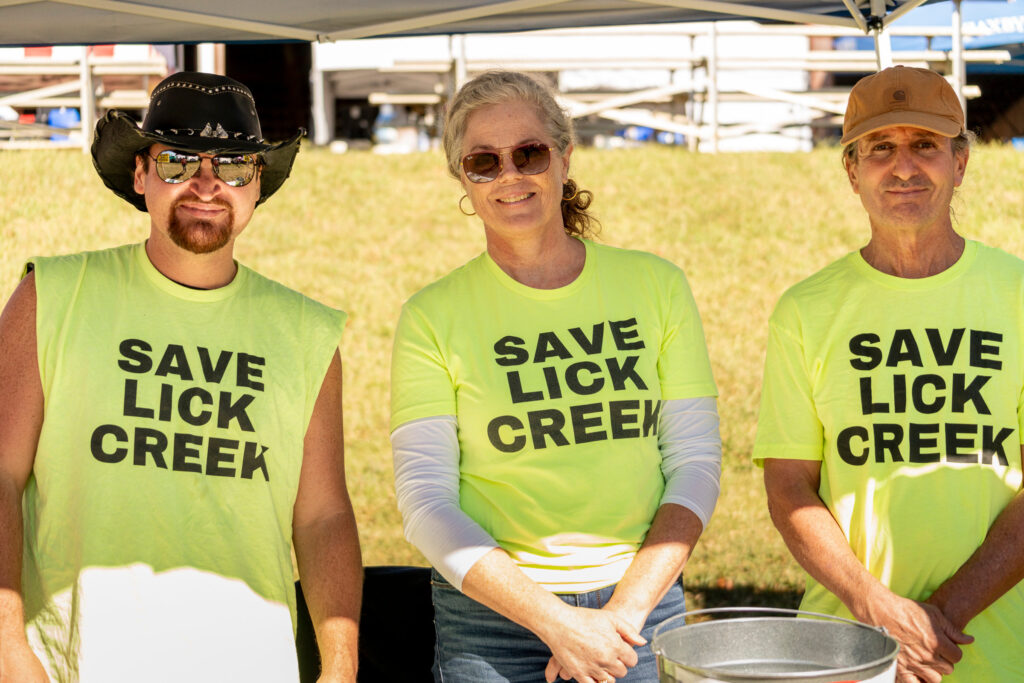
Hickman County residents are suing the Dickson County water authority for not turning over documents related to its plan to discharge sewage effluent from Williamson and Davidson County into a Hickman County creek.
A group of Hickman County residents trying to prevent sewage effluent from being dumped in a nearby creek have filed a public records lawsuit against the Dickson County water authority, trying to get documents to better understand what led to the government’s plans.
“Transparency has been a problem since the beginning,” said one of the residents, Rodes Hart, in a press release. “For example, the WADC (Water Authority of Dickson County) did not properly disclose their intent to build a sewage treatment plant in Hickman County and has continuously kept vital information from the public including a potential site for the new plant. If the WADC insists on dumping waste from neighboring counties into an Exceptional Tennessee Water, it could at least abide by the law.”
Friends of Lick Creek and Hart say in their lawsuit that the Water Authority of Dickson County has withheld numerous documents that led to the decision to build the Lick Creek sewage treatment plant, including analysis of alternatives and data backing the proposal.
Through a public records request, the residents asked for several sets of documents, including reports, studies, cost data/analysis, similar documents related to specific projects, infrastructure, and analyses of alternatives. They also asked for correspondence with the Hickman County Commissioners about the project.
However, the water authority produced only 35 documents, most of which had already been submitted to the Tennessee Department of Environment and Conservation and were on the state agency website, and no correspondence with the county commission.
“…the Petitioners reasonably expected to see…the notes, drafts, internal communications, deliberations, and other preliminary documents that are the natural and common result of researching and preparing a final report or analysis,” the lawsuit said.
The lawsuit also noted that “(c)onspicuously missing from the production were any documents responsive to the Petitioners’ explicit request for ‘correspondence, including texts, emails, letters, voicemails, and other documents,’ between representatives of the (water authority) and the Hickman County Commissions related to the Lick Creek Project,” the lawsuit says.
Another document not turned over was a study by Tennessee Tech that was commmissioned by the water authority in relation to the Lick Creek project, the lawsuit said.
“Simply stated, the records produced by (the water authority) are not reflective of the entire body of documents that would reasonably and naturally be in its files or possession as a result of creating the records that it actually did produce,” the lawsuit said.
Lick Creek would become the ‘toilet’ of Williamson, Davidson counties

A man fishes on Lick Creek, which has been classified as an “exceptional Tennessee waterway” because of its biodiversity.
Lick Creek flows directly into the Duck River and has been classified as an “exceptional Tennessee waterway” due to its biodiversity. According to the Friends of Lick Creek website, the plans call for dumping 12 million gallons per day of wastewater effluent into the creek.
The group notes that 97% of the sewage would come from the wealthier and highly developed Dickson and Williamson counties, not Hickman County.
“This creek is pristine, and we want to keep it that way,” Hart told The Tennessean in a Jan. 5 article.
Hart characterized their fight against the water authority as a “David and Goliath” battle with a utility that is trying to steamroll a small community for its own financial gain, making Hickman County the “toilet” for its richer county neighbors that are growing rapidly.
Public records law requires all responsive records to be provided

Residents opposed to sewage effluent in Lick Creek are trying to get more information from Dickson County water authority.
The lawsuit alleges that the public records law was broken because the law requires government officials to “fully and faithfully” respond to public records requests.
It pointed to a 2022 Court of Appeals ruling in Conley v. Knox County Sherriff that stated that a government entity that produces some, but not all, of the records that would be responsive to the records request has denied the request and has “hardly demonstrate[d] its faithful and legal administration of the (Tennessee Public Records Act).”
The law requires government entities to “search for and produce ‘any public record not specifically exempt from disclosure,'” the Conley ruling states. In that case, the Knox County Sheriff was found to deny requests without fully searching for records requested by a University of Tennessee sociology professor studying its program on detaining illegal immigrants.
A date has not yet been set for the show cause hearing in the Lick Creek lawsuit. In a show cause hearing, the water authority must show why it did not provide other records.
The residents are represented by B. Hart Knight and Katherine Barnes with Butler Snow LLP.




